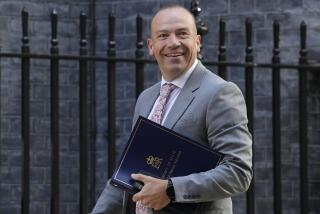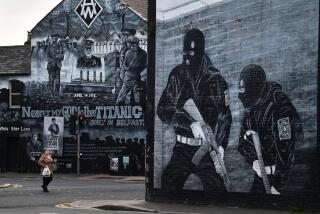A Dark British Role in Irish Killings
- Share via
This week, 15 years after Catholic lawyer Pat Finucane was gunned down in front of his wife and three children at their Belfast home -- shot 14 times by two masked gunmen -- one of his killers, Ken Barrett, was sentenced by a Belfast court for murder.
It’s a start, but it’s only a start, because the British government is continuing to duck the key questions surrounding the murder and hundreds of others like it.
This week, as the British and Irish governments and all the main political parties in the north of Ireland gather at Leeds Castle in Britain for peace talks, it is critical that Prime Minister Tony Blair not be allowed to ignore his government’s responsibility for creating years of political instability.
One of the issues that has been on the agenda of every Sinn Fein discussion with Blair since he and I first met in 1997 is the issue of collusion. This is a politically sanctioned tactic that has been at the heart of British policy in Ireland for more than 30 years -- the administrative practice by which British government agencies recruited, trained, supplied information to and protected unionist death squads in order to kill Catholic political opponents and civilians.
Throughout the years of political conflict in Ireland, successive British governments told the world that their involvement in Irish affairs was that of an honest broker. They insisted that they had no military, strategic, political or economic interests in Ireland, and they claimed that the conflict was either a criminal conspiracy by Irish Republicans or a violent dispute between warring religious factions.
All the time this was being peddled by British officials, the British government was in fact protecting its interests in Ireland by waging a war of murder against its political opponents, those who opposed the British occupation of Ireland. This included a shoot-to-kill policy, as well as the institutionalized practice of intelligence and policing agencies colluding with unionist death squads. Hundreds were killed.
Pat Finucane was one of those casualties. A 39-year-old solicitor who represented Irish Republican defendants, his death was found to have been -- in an inquiry by Britain’s senior law enforcement officer, John Stevens -- an unequivocal case of collusion between the unionist paramilitaries and the security forces.
It has now been well established that the unionist death squad that carried out the attack was being controlled and manipulated at every level by both British military intelligence and the Special Branch, the government’s police intelligence arm. The killing took place a few weeks after Douglas Hogg, then an undersecretary of state at the Home Office, said to the British Parliament: “I have to state as a fact but with great regret that there are in Northern Ireland a number of solicitors who are unduly sympathetic to the case of the IRA.”
This is a human rights scandal that, anywhere else, would have brought down governments.
The British politicians and military intelligence agencies that sanctioned the policy of collusion and carried it out have never been held accountable.
What’s more, those responsible for collusion still hold senior positions within the British state and, in July of this year, a dossier went missing from Castlereagh, the Belfast police headquarters, with the personal details of more than 400 leading Irish nationalists.
This file has now turned up in the hands of unionist paramilitaries.
Blair must face up to demands for the truth about collusion and the role of the British state in Ireland in more than 30 years of conflict.
The families of those who died as part of this policy have a right to the truth and, in their pursuit of the truth, deserve the support of the international community.
Since Pat Finucane’s killing in February 1989, his family has campaigned for a full, independent international judicial inquiry. The British government has resisted. Why? Having spoken to Blair and his colleagues on this issue many times, I know that they are very conscious of the fact that Finucane’s killing is only the tip of the iceberg.
In July 2001, the British and Irish governments asked retired Canadian Judge Peter Cory to decide whether public inquiries were justified in a number of cases, including Finucane’s. Blair committed to act on whatever Cory recommended -- and Cory recommended a public inquiry.
Despite this, the British government then said it could not proceed, citing the trial of Ken Barrett, who has now pleaded guilty to Pat’s murder. There is no reason to further delay a public inquiry.
Collusion -- and specifically the killing of Finucane -- is a serious matter, about which the British government cannot continue to hide the truth. Nor can the issue be avoided, given the increasing emphasis on truth processes and reconciliation.
More to Read
Sign up for Essential California
The most important California stories and recommendations in your inbox every morning.
You may occasionally receive promotional content from the Los Angeles Times.













